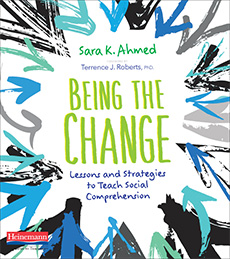"Kids bring an incredible sense of empathy and justice to this world. They understand fairness at an early age, and are often the members of our society who feel and show an organic wonder and compassion for others (p. 119)," - Sara K. AhmedWow, how did we get to the final week so fast??? Following you'll find my reflections of chapters five and six. Please take a minute to stop by the #cyberPD community to see all that is being shared. On Wednesday, we will have our final conversation on Twitter. Join us to discuss Being the Change by Sara K. Ahmed.
Taking Care of Each Other
In my last school, our building team simplified our community conversations to:
- We take care of ourselves.
- We take care of each other.
- We take care of this place.
As I read Sara's last chapters, I thought about how much these three simple statements work in moving conversations from identity to understanding to obligation. It is the first statement that allows children the opportunity to learn about their own identity and understand how their identity might impact the messages they send and receive. It is the second statement that begins to move toward the idea of learning to see things from another perspective and working to understand our universe of obligation. How do we take care of one another?
Three Take-Aways
- There is a difference between intent and impact. "The work of social comprehension requires us to be mindful not only of what we mean to say, but how we say it, and how the messages we send (intentional or not) impact others (p. 131)," Sara reminds. I can think of many instances of working to mediate a disagreement between peers when one student has difficulty understanding the impact of their words on another. Having these conversations around characters and situations that are distanced from a heated moment might help students take a step back and hear the way their words have impacted another.
- We need to understand our obligation to others. The idea of intent vs. impact has its greatest benefit when we can step back before something is said or done because we begin to understand the power of words and the way the identity of others can filter those. These conversations begin in our classrooms, extend to our school communities, and then reach out into the world.
- Find ways to move beyond a single story. The first time I heard Chimamanda Ngozi Adichie's Danger of a Single Story I knew I had been forever changed. If our experience is limited, we become even more vulnerable to making assumptions and creating single stories. Conversations, social media, literature, and news all can help to move us past single stories. In today's world, we have to work to see things from multiple points of view. Sara's last chapter gave many suggestions for becoming "more compassionate observers of the world (p. 140)" and moving past this idea of a single story including being mindful of the identities of others, getting closer to the human story, being an authentic listener, moving beyond your community, and staying open to a stance of learning.
Two Questions
- What are some possible news stories that learners at a variety of ages might be able to view from multiple sides (like her Cleveland example)? As I read I wondered what might be some examples for younger learners, and what other possibilities might open these conversations for older students. While I believe literature would also help students to look at both sides of a situation, I liked the way the news stepped students into the world and pushes thinking toward our obligation beyond our community.
- How do these conversations evolve in our K-5 communities?
One Important Next Step
- Thinking through different lessons that might accomplish these same objectives. Sara has shared smart examples of getting started in growing these conversations. It seems it would be helpful to think through layers of possibility for growing social comprehension in our students.





